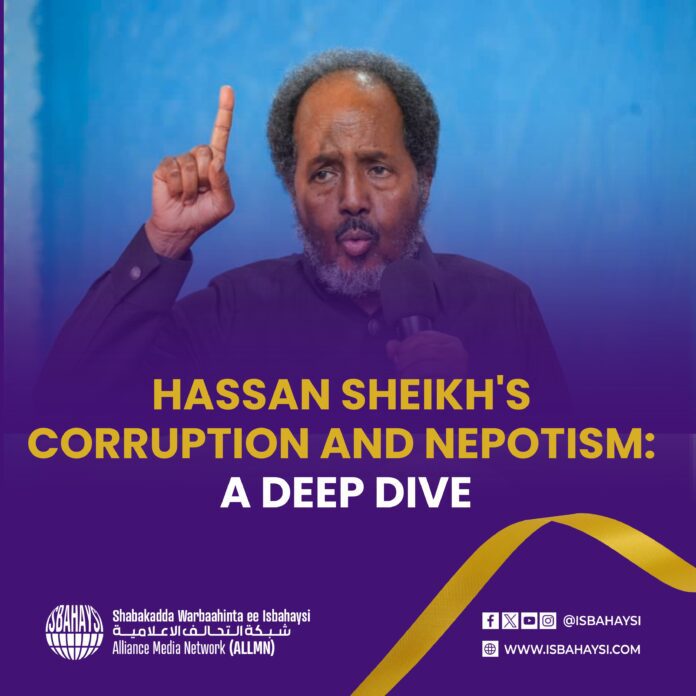Hassan Sheikh Mohamud, the President of Somalia, has recently come under scrutiny for alleged corruption, nepotism, and excessive spending on luxurious travel. These actions starkly contrast with the economic hardships faced by ordinary Somali citizens and the sacrifices made by international donors supporting the country’s development.
Corruption has long plagued Somali politics, but Hassan Sheikh’s tenure appears to have intensified these issues. Reports suggest that under his administration, public funds have been misappropriated for personal and political gain. Funds intended for infrastructure, healthcare, and education have allegedly been diverted to enrich the president and his close associates, undermining public trust and stalling the nation’s progress.
Nepotism is another critical issue in Hassan Sheikh’s administration. It is alleged that key government positions have been filled based on familial ties and loyalty rather than merit and qualifications. This practice erodes the efficiency and effectiveness of the government, discourages talented individuals from participating in the public sector, and leaves many capable Somali citizens disillusioned. Consequently, the nation’s potential remains untapped.
One of the most glaring examples of the president’s disregard for the nation’s economic situation is his frequent trips abroad. While international engagement is essential for Somalia’s growth, the frequency and nature of Hassan Sheikh’s trips have raised eyebrows both locally and internationally. While , Hassan Sheikh reportedly enjoys luxury private jets, donors and partners often take commercial flights and use modest accommodations. This disparity not only damages Somalia’s reputation but also risks alienating the very partners essential for its progress. Erosion of trust and cooperation could lead to reduced aid and investment, further hindering the nation’s development efforts. The cost of these private flights is exorbitant, especially considering Somalia’s pressing needs. Redirecting these funds towards essential services and infrastructure projects could significantly impact the country’s development. This extravagant spending sends a message of indifference to the struggles of the average Somali citizen and the sacrifices of those supporting the nation’s recovery.
Moreover, the incumbent Prime Minister of Somalia has transferred his responsibilities to the Minister of Education, who is regarded as the supreme leader and often compared to Ayatollah Khomeini. This figure has taken on the prerogative of reshuffling ministers and installing permanent secretaries, consolidating significant power within his role.
Hassan Sheikh’s government has been marked by a blatant abuse of power, showcasing a level of hypocrisy that deeply concerns many Somalis. Despite the need for strong leadership, the current dynamics reveal a government that prioritises personal and political gains over national interests.
Recently, a member of the Somali parliament questioned the Minister of Education, asking why, after releasing $25 million USD for Somaliland, he is withholding $17 million USD for Puntland, a member state of the Somali government. The Grand Ayatollah (the head of the corrupt version of the Muslim Brotherhood) responded dismissively, claiming he is “not smart enough to deal with the Puntland administration,” yet he is apparently capable of engaging with secessionists.
The Somali people require a Prime Minister who fully understands and upholds his responsibilities, adheres to the constitution, and places the nation’s interests above all else. Effective governance necessitates a commitment to transparency, accountability, and service to the public. It is time for leadership that not only respects but also actively enforces these principles, ensuring that the office of the Prime Minister operates with integrity and dedication to Somalia’s progress.
Hassan Sheikh’s administration faces serious allegations of corruption, nepotism, and irresponsible spending. These practices not only undermine Somalia’s progress but also tarnish its international reputation. For Somalia to move forward, it is imperative that its leaders prioritise transparency, meritocracy, and fiscal responsibility. The Somali people deserve leaders committed to the nation’s welfare and development, not those who exploit their positions for personal gain. It is time for a change in leadership that truly reflects the values and aspirations of the Somali people.
_____________________________________________________________________________________
The author, Hussein Soyan, is a managing director of Soyan Financial Consultancy Ltd, a leading consultancy firm in East Africa, which specialises in Islamic finance solutions. X Twitter: @SoyanHussein






